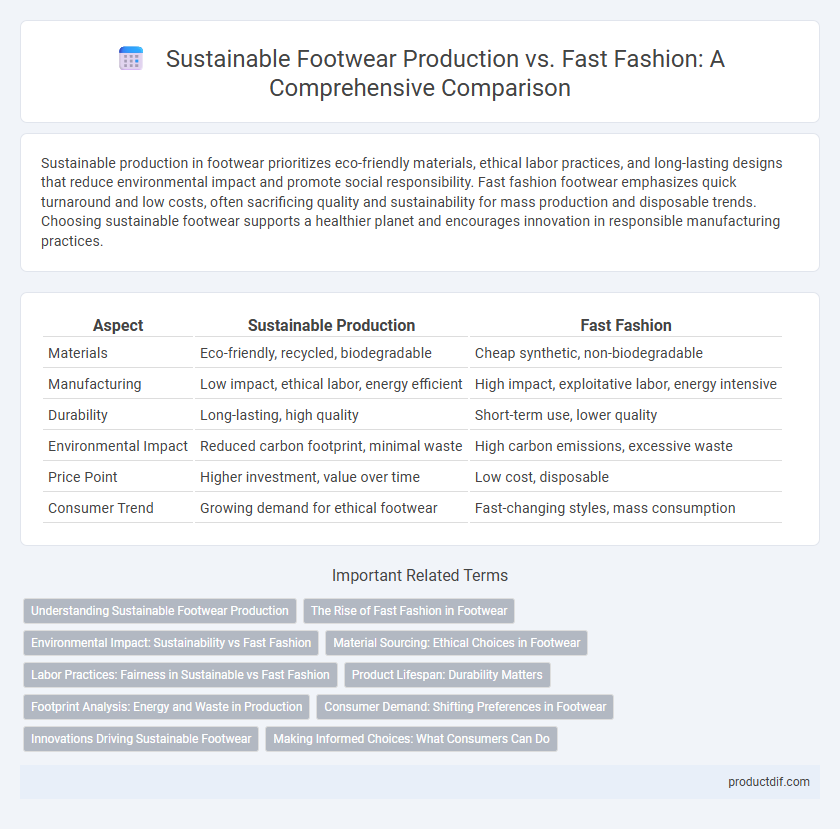Sustainable production in footwear prioritizes eco-friendly materials, ethical labor practices, and long-lasting designs that reduce environmental impact and promote social responsibility. Fast fashion footwear emphasizes quick turnaround and low costs, often sacrificing quality and sustainability for mass production and disposable trends. Choosing sustainable footwear supports a healthier planet and encourages innovation in responsible manufacturing practices.
Table of Comparison
| Aspect | Sustainable Production | Fast Fashion |
|---|---|---|
| Materials | Eco-friendly, recycled, biodegradable | Cheap synthetic, non-biodegradable |
| Manufacturing | Low impact, ethical labor, energy efficient | High impact, exploitative labor, energy intensive |
| Durability | Long-lasting, high quality | Short-term use, lower quality |
| Environmental Impact | Reduced carbon footprint, minimal waste | High carbon emissions, excessive waste |
| Price Point | Higher investment, value over time | Low cost, disposable |
| Consumer Trend | Growing demand for ethical footwear | Fast-changing styles, mass consumption |
Understanding Sustainable Footwear Production
Sustainable footwear production emphasizes eco-friendly materials such as organic cotton, recycled rubber, and biodegradable insoles, reducing environmental impact compared to conventional fast fashion methods. Innovative techniques like waterless dyeing and energy-efficient manufacturing processes help lower carbon footprints while maintaining durability and style. Transparency in supply chains and adherence to fair labor practices ensure that sustainable footwear supports both environmental stewardship and social responsibility.
The Rise of Fast Fashion in Footwear
The rise of fast fashion in footwear has led to increased production cycles, emphasizing rapid turnaround and low costs at the expense of environmental sustainability. Fast fashion brands prioritize mass-produced, trend-driven shoes that contribute to significant waste and resource depletion, contrasting sharply with sustainable production methods that focus on durability and eco-friendly materials. This shift challenges the footwear industry to balance consumer demand for affordability and style with the urgent need for sustainable manufacturing practices.
Environmental Impact: Sustainability vs Fast Fashion
Sustainable footwear production minimizes environmental impact through the use of eco-friendly materials, reduced water consumption, and lower carbon emissions compared to fast fashion methods. Fast fashion footwear often relies on synthetic materials and mass manufacturing processes that generate significant waste, pollution, and contribute to resource depletion. By prioritizing durability and recyclability, sustainable brands help reduce landfill waste and promote a circular economy within the footwear industry.
Material Sourcing: Ethical Choices in Footwear
Sustainable footwear prioritizes material sourcing from renewable and biodegradable resources such as organic cotton, recycled polyester, and natural rubber, minimizing environmental impact and promoting ethical labor practices. Fast fashion footwear often relies on synthetic, non-recyclable materials like PVC and polyurethane, which contribute to pollution and exploit low-cost labor markets. Ethical choices in material sourcing foster transparency, reduce carbon footprints, and support fair trade certifications within the footwear industry.
Labor Practices: Fairness in Sustainable vs Fast Fashion
Sustainable footwear production emphasizes fair labor practices, ensuring safe working conditions, living wages, and workers' rights, contrasting sharply with fast fashion's reliance on exploitative labor and low wages. Brands committed to sustainability often invest in transparent supply chains and third-party audits to uphold ethical standards. Fast fashion prioritizes rapid output and cost-cutting, frequently resulting in labor exploitation and poor employee treatment.
Product Lifespan: Durability Matters
Sustainable footwear emphasizes durability by using high-quality materials and craftsmanship to extend product lifespan, reducing waste and environmental impact. In contrast, fast fashion shoes prioritize rapid production and low cost, often resulting in inferior durability and short usage periods. Choosing long-lasting footwear supports sustainable consumption and minimizes the frequency of replacements, fostering responsible environmental stewardship.
Footprint Analysis: Energy and Waste in Production
Sustainable footwear production significantly reduces the carbon footprint by utilizing renewable energy sources and minimizing waste through circular manufacturing processes. Fast fashion footwear relies heavily on energy-intensive production methods, generating large quantities of landfill waste and microplastic pollution. Lifecycle assessments reveal that sustainable brands achieve up to 50% lower emissions and 40% less material waste compared to conventional fast fashion counterparts.
Consumer Demand: Shifting Preferences in Footwear
Consumer demand in footwear is increasingly favoring sustainable production methods over fast fashion due to growing awareness of environmental impact and ethical considerations. Market data shows a significant rise in sales of eco-friendly sneakers and shoes made from recycled or biodegradable materials, reflecting a shift in purchase behavior. Brands adopting transparent supply chains and promoting durability respond directly to consumers prioritizing long-term value and minimal ecological footprint.
Innovations Driving Sustainable Footwear
Innovations in sustainable footwear production prioritize biodegradable materials, such as plant-based leathers and recycled polymers, reducing environmental impact significantly. Advanced manufacturing techniques like 3D knitting and zero-waste cutting optimize resource efficiency and minimize waste in the supply chain. Brands integrating renewable energy and circular economy principles reshape fast fashion by promoting durability and recyclability in footwear design.
Making Informed Choices: What Consumers Can Do
Consumers can prioritize sustainable footwear brands that use eco-friendly materials such as recycled plastics, organic cotton, and natural rubber to reduce environmental impact. Investing in durable, high-quality shoes minimizes waste and supports ethical labor practices, contrasting with the disposable nature of fast fashion footwear. Researching brand transparency and certifications like Fair Trade or Global Organic Textile Standard helps buyers make informed choices that promote sustainability in the footwear industry.
Sustainable Production vs Fast Fashion Infographic

 productdif.com
productdif.com